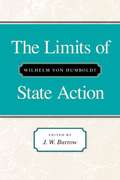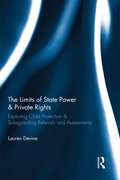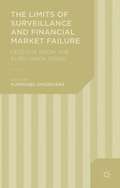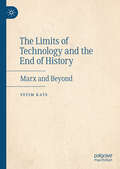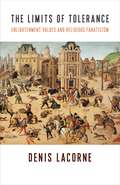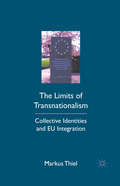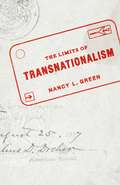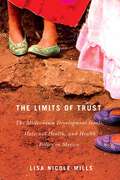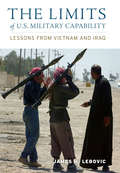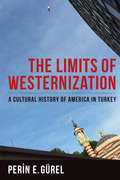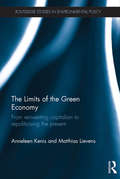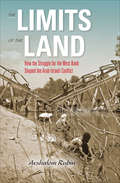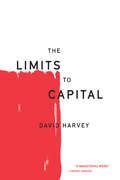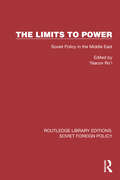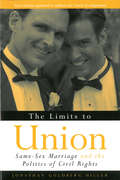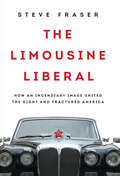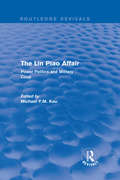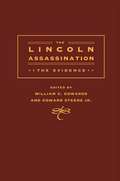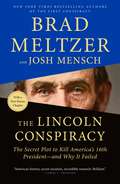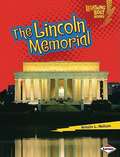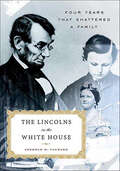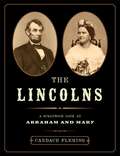- Table View
- List View
The Limits of State Action
by Wilhelm Von Humboldt J. W. BurrowThe Limits of State Action has an exuberance and attention to principle that make it a valuable introduction to classical liberal political thought It is also crucial for an understanding of liberalism as it developed in Europe at the turn of nineteenth century. Humboldt explores the role that liberty plays in individual development, discusses criteria for permitting the state to limit individual action's and suggests ways of confining the state to its proper bounds.
The Limits of State Action
by Wilhelm Von HumboldtThe grand, leading principle, towards which every argument . . . unfolded in these pages directly converges, is the absolute and essential importance of human development in its richest diversity. This description by Wilhelm von Humboldt of his purpose in writing The Limits of State Action animates John Stuart Mill's On Liberty and serves as its famous epigraph. Seldom has a book spoken so dramatically to another writer. Many commentators even believe that Humboldt's discussion of issues of freedom and individual responsibility possesses greater clarity and directness than Mill's. The Limits of State Action, by "Germany's greatest philosopher of freedom," as F. A. Hayek called him, has an exuberance and attention to principle that make it a valuable introduction to classical liberal political thought. It is also crucial for an understanding of liberalism as it developed in Europe at the turn of the nineteenth century. Humboldt explores the role that liberty plays in individual development, discusses criteria for permitting the state to limit individual actions, and suggests ways of confining the state to its proper bounds. In so doing, he uniquely combines the ancient concern for human excellence and the modern concern for what has come to be known as negative liberty. J. W. Burrow is Professor of History at the University of Sussex.
The Limits of State Power & Private Rights: Exploring Child Protection & Safeguarding Referrals and Assessments
by Lauren DevineThis book tackles a complex area of law, social policy and social work, providing a comprehensive analysis of the theoretical, practical and legal boundaries of State power following safeguarding and child protection referrals in England. The book examines the history, rationale and implications of the current position, concluding that the balance of power is weighted in favour of the State. The Limits of State Power & Private Rights is ground-breaking in its approach to the subject and its detailed, critical analysis. Traditionally the subject matter of the book is considered within a welfare framework. The analysis in this book argues that a policing agenda is embedded within policy but without appropriate safeguards and controls, creating potentially irreconcilable tension described by the author as the ‘welfare/policing dichotomy’. This book is of importance to academics, lawyers, social workers, policy makers, practitioners and service users. The book is written so as to be accessible to a multi-disciplinary audience, but is sufficiently detailed so as to be suitable for specialists and non-specialists alike in this subject area. The chapters include introductory and contextual sections as well as doctrinal, theoretical and socio-legal analysis. Although the focus is on the English system, the book is equally applicable to the many worldwide jurisdictions adopting the Anglo/American ‘child rights’ based framework of child protection. It is also of use as a comparative work in countries where a family support based system is practiced.
The Limits of Surveillance and Financial Market Failure
by Kumiharu ShigeharaThis book examines the effectiveness of surveillance by international institutions for financial crisis prevention. It discusses issues relating to designing effective micro- and macro-prudential policies, their mixes and their coordination with monetary policies for achieving financial stability while promoting better macroeconomic performance.
The Limits of Technology and the End of History: Marx and Beyond
by Yefim KatsThis book examines the long-standing belief in infinite scientific and technological progress and links it to the Enlightenment ideal of man as a universal being and subject of the universal world history, destined to become a 'master and possessor of nature.' The author analyzes a broad range of issues in epistemology, the philosophy of history, and the philosophy of science and technology. Marx’s philosophy is explored to the extent that his dialectic of labor sheds light on Western technological optimism and the ideal of human universality and offers an elaborate framework for analyzing the intrinsic limits to technological progress. The focus is on his ‘early’ works, providing a theoretical and humanistic underbelly for the ‘mature’ ideas of the Capital. Examining the epistemic foundations of the belief in infinite progress, the author argues that actual infinity, either in the form of unbounded technological/scientific expansion or infinite complexity of nature, is redundant for the universality of man, his scientific pursuit and historical experience. The conundrum of universality and power calls for a systematic critique of instrumental reason, its practical applicability and value structure.
The Limits of Tolerance: Enlightenment Values and Religious Fanaticism (Religion, Culture, and Public Life #4)
by Denis LacorneThe modern notion of tolerance—the welcoming of diversity as a force for the common good—emerged in the Enlightenment in the wake of centuries of religious wars. First elaborated by philosophers such as John Locke and Voltaire, religious tolerance gradually gained ground in Europe and North America. But with the resurgence of fanaticism and terrorism, religious tolerance is increasingly being challenged by frightened publics.In this book, Denis Lacorne traces the emergence of the modern notion of religious tolerance in order to rethink how we should respond to its contemporary tensions. In a wide-ranging argument that spans the Ottoman Empire, the Venetian republic, and recent controversies such as France’s burqa ban and the white-supremacist rally in Charlottesville, The Limits of Tolerance probes crucial questions: Should we impose limits on freedom of expression in the name of human dignity or decency? Should we accept religious symbols in the public square? Can we tolerate the intolerant? While acknowledging that tolerance can never be entirely without limits, Lacorne defends the Enlightenment concept against recent attempts to circumscribe it, arguing that without it a pluralistic society cannot survive. Awarded the Prix Montyon by the Académie Française, The Limits of Tolerance is a powerful reflection on twenty-first-century democracy’s most fundamental challenges.
The Limits of Transnationalism
by Markus ThielThrough the application of public opinion, interview, and print-media analyses, this book provides evidence that the state of transnational identification among citizens in the EU as a result of post-Maastricht integration measures, such as the completion of the Common Market, the introduction of the Euro, the initiation of the Common Foreign and Security Policy etc. in the United Kingdom, Ireland, and Germany had limited effects in the member states to the extent that national political cultures and mass media orientations are compatible with the goals of EU integration. Policy recommendations are derived by reviewing the complex relationship between EU policies and structural factors such as immigration, ageing and the mediatization of politics in which European integration occurs.
The Limits of Transnationalism
by Nancy L. GreenTransnationalism means many things to many people, from crossing physical borders to crossing intellectual ones. The Limits of Transnationalism reassesses the overly optimistic narratives often associated with this malleable term, revealing both the metaphorical and very real obstacles for transnational mobility. Nancy L. Green begins her wide-ranging examination with the story of Frank Gueydan, an early twentieth-century American convicted of manufacturing fake wine in France who complained bitterly that he was neither able to get a fair trial there nor to enlist the help of US officials. Gueydan’s predicament opens the door for a series of inquiries into the past twenty-five years of transnational scholarship, raising questions about the weaknesses of global networks and the slippery nature of citizenship ties for those who try to live transnational lives. The Limits of Transnationalism serves as a cogent reminder of this topic’s complexity, calling for greater attention to be paid to the many bumps in the road.
The Limits of Trust: The Millennium Development Goals, Maternal Health, and Health Policy in Mexico (McGill-Queen's Studies in Gender, Sexuality, and Social Justice in the Global South #3)
by Lisa Nicole MillsWhy Mexico didn&’t meet the maternal health Millennium Development Goal, in spite of health care reform and NGO initiatives.
The Limits of U.S. Military Capability: Lessons from Vietnam and Iraq
by James H. LebovicPolitical scientist James H. Lebovic establishes that the size, strength, flexibility, and adaptability of the U.S. military cannot ensure victory in asymmetrical conflicts.In The Limits of U.S. Military Capability, Lebovic shows how political and psychological factors trumped U.S. military superiority in Vietnam and Iraq, where inappropriate strategies, low stakes, and unrealistic goals mired the United States military in protracted, no-win conflicts. Lebovic contends that the United States is at a particular disadvantage when fighting a counterinsurgency without the full support of the host government; when leveraging various third parties (the adversary's foreign allies, societal leaders, and indigenous populations); when attempting to build coalitions and nations while involved in combat; and when sustaining government and public support at home when costs rise and benefits decline.Lebovic cautions against involving the U.S. military in operations without first considering U.S. stakes and suggests that the military take a less-is-more approach when choosing to employ force. Ambitious goals bring higher costs, unexpected results, diminished options, and a greater risk of failure. Rejecting the heavy-handed approach that is typical of most comparisons between the Vietnam and Iraq wars, The Limits of U.S. Military Capability carefully assesses evidence to develop lessons applicable to other conflicts—especially the ongoing war in Afghanistan.
The Limits of Westernization: A Cultural History of America in Turkey (Columbia Studies in International and Global History)
by Perin GürelIn a 2001 poll, Turks ranked the United States highest when asked: "Which country is Turkey's best friend in international relations?" When the pollsters reversed the question—"Which country is Turkey's number one enemy in international relations?"—the United States came in second. How did Turkey's citizens come to hold such opposing views simultaneously? In The Limits of Westernization, Perin E. Gürel explains this unique split and its echoes in contemporary U.S.-Turkey relations. Using Turkish and English sources, Gürel maps the reaction of Turks to the rise of the United States as a world-ordering power in the twentieth century. As Turkey transitioned from an empire to a nation-state, the country's ruling elite projected "westernization" as a necessary and desirable force but also feared its cultural damage. Turkish stock figures and figures of speech represented America both as a good model for selective westernization and as a dangerous source of degeneration. At the same time, U.S. policy makers imagined Turkey from within their own civilization templates, first as the main figure of Oriental barbarism (i.e., "the terrible Turk"), then, during the Cold War, as good pupils of modernization theory. As the Cold War transitioned to the War on Terror, Turks rebelled against the new U.S.-made trope of the "moderate Muslim." Local artifacts of westernization—folk culture crossed with American cultural exports—and alternate projections of modernity became tinder for both Turkish anti-Americanism and resistance to state-led modernization projects. The Limits of Westernization analyzes the complex local uses of "the West" to explain how the United States could become both the best and the worst in the Turkish political imagination. Gürel traces how ideas about westernization and America have influenced national history writing and policy making, as well as everyday affects and identities. Foregrounding shifting tropes about and from Turkey—a regional power that continues to dominate American visions for the "modernization" of the Middle East—Gürel also illuminates the transnational development of powerful political tropes, from "the Terrible Turk" to "the Islamic Terrorist."
The Limits of the Green Economy: From re-inventing capitalism to re-politicising the present (Routledge Studies in Environmental Policy)
by Anneleen Kenis Matthias LievensProjecting win-win situations, new economic opportunities, green growth and innovative partnerships, the green economy discourse has quickly gained centre stage in international environmental governance and policymaking. Its underlying message is attractive and optimistic: if the market can become the tool for tackling climate change and other major ecological crises, the fight against these crises can also be the royal road to solving the problems of the market. But how ‘green’ is the green economy? And how social or democratic can it be? This book examines how the emergence of this new discourse has fundamentally modified the terms of the environmental debate. Interpreting the rise of green economy discourse as an attempt to re-invent capitalism, it unravels the different dimensions of the green economy and its limits: from pricing carbon to emissions trading, from sustainable consumption to technological innovation. The book uses the innovative concept of post-politics to provide a critical perspective on the way green economy discourse represents nature and society (and their interaction) and forecloses the imagination of alternative socio-ecological possibilities. As a way of repoliticising the debate, the book advocates the construction of new political faultlines based on the demands for climate justice and democratic commons. This book will be of interest to students and scholars of environmental politics, political ecology, human geography, human ecology, political theory, philosophy and political economy. Includes a foreword written by Erik Swyngedouw (Professor of Geography, Manchester University).
The Limits of the Land: How the Struggle for the West Bank Shaped the Arab-Israeli Conflict (Perspectives on Israel Studies)
by Avshalom Rubin&“An outstanding historical analysis of a core component to the current Middle East dilemma between Israel and the Palestinians.&”—Choice Reviews Was Israel&’s occupation of the West Bank inevitable? From 1949-1967, the West Bank was the center of the Arab-Israeli conflict. Many Israelis hoped to conquer it and widen their narrow borders, while many Arabs hoped that it would serve as the core of a future Palestinian state. In The Limits of the Land, Avshalom Rubin presents a sophisticated new portrait of the Arab-Israeli struggle that goes beyond partisan narratives of the past. Drawing on new evidence from a wide variety of sources, many of them only recently declassified, Rubin argues that Israel&’s leaders indeed wanted to conquer the West Bank, but not at any cost. By 1967, they had abandoned hope of widening their borders and adopted an alternative strategy based on nuclear deterrence. In 1967, however, Israel&’s new strategy failed to prevent war, convincing its leaders that they needed to keep the territory they conquered. The result was a diplomatic stalemate that endures today. &“Based on a meticulous examination of numerous Israeli, US, and British archives, as well as relevant Arabic and Russian literature, Avshalom Rubin covers the role of the West Bank in the Arab-Israeli conflict in a comprehensive way. His book stands alone at the top of work on Israeli-Jordanian relations of the period.&”—Robert O. Freedman, author of Israel and the United States: Six Decades of US-Israeli Relations
The Limits to Capital
by David HarveyThe Limits to Capital provides one of the best theoretical guides to the history and geography of capitalist development. In this new edition, Harvey updates his classic text with a substantial discussion of the turmoil in world markets today.In his analyses of ‘fictitious capital’ and ‘uneven geographical development’ Harvey takes the reader step by step through layers of crisis formation, beginning with Marx’s controversial argument concerning the falling rate of profit, moving through crises of credit and finance, and closing with a timely analysis geopolitical and geographical considerations.
The Limits to Power: Soviet Policy in the Middle East (Routledge Library Editions: Soviet Foreign Policy #10)
by Yaacov Ro’iThe Limits to Power (1979) analyses the spectrum of Soviet interests and policies in the Middle East following the Yom Kippur War of October 1973: how the Soviets handled the oil question, military and economic aid, policy toward Egypt, Syria, Iraq, the Palestinian organisations – and toward Israel itself. The Soviet position in the Middle East in 1970 was as the dominant foreign power in the region, and this book examines the events and actions that resulted, under a decade later, in such a sharp reversal in Soviet fortunes. The ebb-and-flow of Soviet diplomacy, as it emerges from the wealth of official statements and press material, is examined in detail.
The Limits to Union: Same-Sex Marriage and the Politics of Civil Rights
by Jonathan Goldberg-HillerRevised and updated to include the most current information on same-sex marriage, The Limits to Union documents a legal struggle at its moment of greatest historical importance.
The Limousine Liberal: How an Incendiary Image United the Right and Fractured America
by Steve FraserNo political metaphor in recent American history has enjoyed the impact of the limousine liberal. Taking aim at what many consider the hypocrisy of wealthy liberals who champion the cause of the poor but who have no intention of bearing the costs of doing anything about their plight, it has mobilized an enduring politics of resentment against everything from civil rights to environmental regulation. In The Limousine Liberal, Steve Fraser argues that the metaphor of the limousine liberal has had a pernicious effect on American political culture. From Henry Ford's attacks on Jews, bankers, and Bolsheviks in the 1920s to the Tea Party's vehement hatred of Barack Obama and Hillary Clinton, it has served as the animus binding together right-wing populism in America. In the vein of the late Richard Hofstadter, Fraser dives down below the surface of rational political life to identify and understand the right's most elemental fears.
The Lin Piao Affair (Routledge Revivals): Power Politics and Military Coup
by Michael Y.M. KauFirst published in 1975, this book is concerned with the facts and implications of the case of Lin Piao and his army, as well as with the broader question of military intervention in the authoritarian polity of developing countries. A wide range of materials is presented, including "top-secret" documents of the CCP Central Committee, Lin Piao’s own writings and speeches from the 1966-1970 period, pertinent material from the Tenth Party Congress, and press criticism. In their introduction, the author provides a thorough critical analysis of the case of Lin Piao and of the dynamic of power politics that emerged from the Cultural Revolution in the late 1960s.
The Lincoln Assassination: The Evidence
by Edward Steers William C. EdwardsOn April 22, 1865, Brevet Colonel H. L. Burnett was assigned to head the investigation into the murder of President Abraham Lincoln and the attempted murder of Secretary of State William H. Seward. Burnett orchestrated the collection of thousands of documents for the Military Commission's trial of the conspirators. This deep archive of documentary evidence--consisting of letters, depositions, eyewitness accounts, investigative reports, and other documents--provides invaluable insight into the historical, cultural, and judicial context of the investigation. Only a fraction of the information presented in these documents ever made its way into the trial, and most of it has never been readily accessible. By presenting an annotated and indexed transcription of these documents, this volume offers significant new access to information on the events surrounding the assassination and a vast new store of social and political history of the Civil War era. "With tears in my eyes I think it your duty to hang every rebel caught. I feel as bad as if was my own mother or father & will be one to volunteer to try & shoot every Southern man. May God have mercy on the man's soul that done such a deed. With much Respect for our Country, I remain Weeping" --Anonymous letter, New York, April 15, 1865 "I know Booth. He was in the habit of coming to my place to shoot. . . . He shot well, and practiced to shoot with accuracy in every possible position. . . . He was a quick shot; always silent, reticent." --Deposition of Benjamin Barker, Pistol Gallery proprietor
The Lincoln Conspiracy: The Secret Plot to Kill America's 16th President--and Why It Failed
by Brad Meltzer Josh MenschBrad Meltzer and Josh Mensch, the bestselling authors of The First Conspiracy, which covers the secret plot against George Washington, now turn their attention to a little-known, but true story about a failed assassination attempt on the sixteenth president in The Lincoln Conspiracy.Everyone knows the story of Abraham Lincoln’s assassination in 1865, but few are aware of the original conspiracy to kill him four years earlier in 1861, literally on his way to Washington, D.C., for his first inauguration. The conspirators were part of a white supremacist secret society that didn’t want an abolitionist in the White House. They planned an elaborate scheme to assassinate the President-elect in Baltimore as Lincoln’s inauguration train passed through, en route to the nation's capital. The plot was investigated by famed detective Allan Pinkerton, who infiltrated the group with undercover agents, including Kate Warne, one of the first female private detectives in America.Had the assassination succeeded, there would have been no Lincoln Presidency and the course of the Civil War and American history would have forever been altered.
The Lincoln Memorial
by Kristin L. NelsonHow big is the statue of President Abraham Lincoln inside the Lincoln Memorial? Whose idea was the Lincoln Memorial? and how did workers build the amazing statue? Read this book to find out.
The Lincoln-Douglas Debates (Dover Thrift Editions)
by Abraham Lincoln Stephen A. Douglas Edwin Erle SparksOne of the most significant and far-reaching events in U. S. history, the Lincoln-Douglas debates of 1858 sharpened and brought to a head a number of crucial questions concerning slavery, states' rights, the legal status of blacks, and the effects of the Dred Scott decision. The debates were held as part of the campaign for the Illinois senatorial seat, pitting the two-term incumbent, Democrat Stephen A. Douglas, against the lesser-known Abraham Lincoln, a successful lawyer and former state politician who was the Republican candidate.Paving the way for modern discussions between political candidates, the Lincoln-Douglas debates fascinated nineteenth-century America and catapulted Lincoln into the spotlight. Although he lost the race to Douglas, the stature and recognition Lincoln gained during the exchanges helped propel him to the presidency in 1860, just two years later. This volume features rousing speeches by each candidate and the rejoinders and replies.
The Lincoln-Douglas Debates of 1858
by James L. Huston Robert W. JohannsenTo celebrate the 150th anniversary of the most famous political argument in U.S. history, The Lincoln-Douglas Debates of 1858 is now available in a special commemorative edition. As Abraham Lincoln and Stephen A. Douglas fiercely competed for the Illinois seat in the U.S. Senate, they debated many of the crucial and controversial issues--including slavery--that would later come to define Lincoln's political career. Thoughtfully edited by acclaimed historian Robert W. Johannsen, this essential manuscript captures a groundbreaking and provocative moment in American politics. <p><p> Framed by an insightful new foreword by Johannsen's former student James L. Huston, this series of debates communicates the eloquence, urgency, and immediacy of its historical moment. To make these arguments more relevant to contemporary readers, Huston discusses the historiography of the debates since 1965, how various historians have addressed the debates, and why the debates remain so important today. This indispensable resource also includes Douglas's Chicago speech and Lincoln's "House Divided" speech. Providing a timely and engrossing look at this dynamic event, the 150th anniversary edition of The Lincoln-Douglas Debates of 1858 remains the authoritative presentation of these lively, landmark orations.
The Lincolns in the White House: Four Years That Shattered a Family
by Jerrold M. PackardFrom the day of Abraham Lincoln's inauguration, a nation divided by savage conflict confronted the new president. But what many don't know was that within the White House's walls, the Lincoln's family would soon find itself suffering turmoil mirroring that of the nation he led.Savagely criticized for her extravagance by the American public and widely distrusted because of her southern roots, first lady Mary Lincoln's increasing instability would deeply strain her marriage and eventually end in her mental collapse. The couple was devastated when eleven-year-old Willie died in the White House of typhoid fever. Tad, the youngest son, remained the family joy despite his physical impairments. Though their son Robert's success at Harvard made his parents proud, his relationship with them was troubled and would result in a painful estrangement, one which would eventually permanently separate him from his mother. The president's assassination brutally crushed Mary's always-fragile spirits. After leaving the White House and following Tad's early death, the former first lady retreated into increasing eccentricity and seclusion until her death in 1882. A moving and poignant portrait of the family life of America's greatest president.
The Lincolns: A Scrapbook Look at Abraham and Mary
by Candace FlemingThe award-winning author of "Ben Franklin's Almanac" has created a unique joint biography of Abraham and Mary Lincoln--a scrapbook history that uses photographs, letters, engravings, and even cartoons, along with a fascinating text. Perfect for reluctant readers as well as history lovers, "The Lincolns" provides a living, breathing portrait of a man, a woman, and a country.
